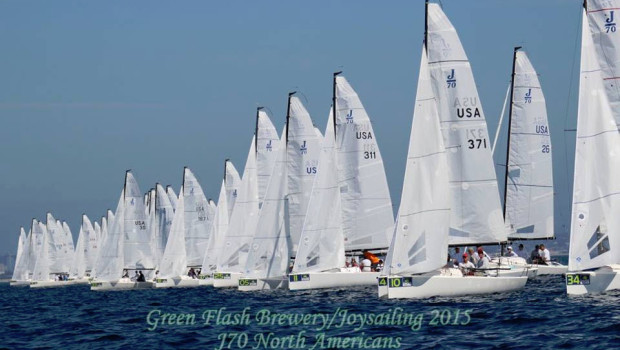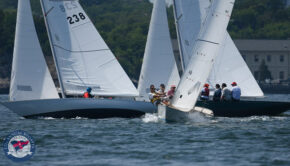Sport Grows When Kindness Occurs
Published on September 27th, 2015
by Craig Leweck, Scuttlebutt
When one design classes hold their prominent championship events, it is a convention of class participants that provides the opportunity to assess many things. Measurers can detect issues while sailors can gather ideas. It is also the opportunity for a class culture to develop, with members from distant fleets coming to together to develop standards to bring back to their home waters.
Since its launch in 2012, the quick and significant growth of the J/70 class has fostered big fleets and tough competition. But talking to a few people at the J/70 North Americans in San Diego, the class may still need some time to work on its competitive culture.
Despite the focus on competition, one design racing is ultimately a social setting. People coming together, with something in common, doing something they enjoy, and sharing the experience afterwards. At the local level, positive relationships can grow deep, which impact how we play the game. Being fair on the water leads to strong bonds on land. This is how the sport succeeds.
But how we play on the water is dependent on what kind of relationships have been formed, and with a new class like the J/70, this hasn’t had much time to develop. This came to light as I met with some of the competitors at the J/70 North Americans.
The example given to me was the brutality on the first weather leg. With the fleet bunched, tacking on a competitor in the light conditions of the event can send them to their funeral. There might be a strategic reason to tack on a competitor, but typically on the first beat, it is often a 2-for-1 move to look for someone to hit when you want to tack.
It was noted how a poor start would quickly become terminal as a boat got pinged by multiple covers. Thinking about it, from my experience, those kinds of decisions to indiscriminately tack on people occur when you do not have a significant and/or positive relationship with that person.
The first beat is that time in the race to play the ‘long game’ and avoid confrontations. Later in the race, nobody faults you for a tight cover, but early in the race, it is pretty brutal when it occurs without a compelling reason.
This is not an indictment J/70 class. With the growth in the class, clearly there is much right that is occurring. This is more a societal observation. The J/70 class is already rooted at the fleet level, and with time, these things get sorted it out. The more we know and care about our competitors, the more inclined we are to cut them some slack, rather than sticking our heel on their throat. Respect matters.
Sure, big events raise the intensity, but even at those times, only a few people have a chance to win. At least three quarters of the fleet are competing for pleasure, and that has a better chance to be gained when you get to know the people you are competing against. A lesson that applies to all corners of the sport.








 We’ll keep your information safe.
We’ll keep your information safe.